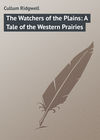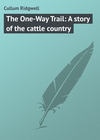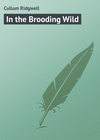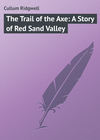Czytaj książkę: «The Watchers of the Plains: A Tale of the Western Prairies», strona 8
CHAPTER XIV
THE WARNING
“Ma,” exclaimed Rosebud, after a long and unusual silence while she was washing up the breakfast things, and Mrs. Sampson was busy with some cleaning at the other side of the kitchen, “do you ever get tired of your work here? Your life, I mean?”
It was early morning. Already the heat in the kitchen was intense. Ma looked hot, but then she was stooping and polishing, and the flies were provoking. Rosebud, in linen overall, still looked cool. Her face was serious enough, which seemed to be the result of some long train of thought. Ma suddenly stopped working to look up, and waved a protesting hand at the swarming flies. She found the girl’s violet eyes looking steadily into hers. There was an earnestness in their depths as unusual as the seriousness of her face. The old woman had been about to answer hastily, but she changed her mind.
“Why should I, child?” she said, as though such a contingency were out of all reason. “It’s all ours, I guess. It’s jest ours to make or mar. Ther’ isn’t a stick on this farm that we haven’t seen set ther’, Rube an’ me. Tired of it? Guess the only tire I’ll feel’ll come when I can’t set foot to the ground, an’ ain’t the strength to kindle a stove or scrub a floor. Tired? No, child. What fixed you to get askin’ that?”
The plates clattered under Rosebud’s hands as she went on with her work. Ma eyed the stack of dishes in some doubt. She thought there might be some excuse for the girl being a little tired of domestic duties. She often wondered about this. Yet she had never heard Rosebud complain; besides, she had a wise thought in the back of her head about the girl’s feelings toward at least one of their little family circle.
“I don’t quite know, Ma,” the girl said at last. Then she added quickly, feeling, of a sudden, that her question had suggested something she did not intend. “Don’t think I am. I was wondering over something else.” She laughed a little uncertainly. “It’s Seth. He’s always harping on my going away. Always thinking of the time when my people are to be found. And I just wondered if he thought I was tired of the farm and wanted to be away. He’s so kind and good to me, and I thought he might, in a mistaken way, believe I’d be happier in – well, with those people who have forgotten my very existence. I love the farm, and – and all of you. And I don’t want to go away.”
Ma turned again to her work with a wise little smile in her twinkling eyes.
“Seth’s a far-seein’ boy, an’ a good boy in ’most everything,” she said, in a tone indicating wholehearted affection; “but he’s like most folks with head-pieces, I guess. He don’t stop at things which it is given to men to understand. Ef I wus a man I’d say of Seth, he’s li’ble to git boostin’ his nose into places not built fer a nose like his. Seein’ I’m his ’Ma,’ I’d jest say he ain’t no call to git figgerin’ out what’s good fer wimminfolk.”
“That’s just what I think,” exclaimed Rosebud, with a quick laugh. “He made me quite angry some time ago. He means to get me off the farm somehow. And – and – I could just thump him for it.” The girl’s seriousness had passed, and she spoke lightly enough now.
“Men-folk do rile you some,” nodded Ma. But the twinkle had not left her eyes. “But, my girl, I shouldn’t be surprised if Seth’s got mighty good reason. An’ it ain’t to do with his personal feelin’s.”
Rosebud went on with her washing without speaking. She was thinking of that picnic she had taken with Seth and General nearly three weeks ago. It had almost developed into a serious quarrel. It would have done so, only Seth refused to quarrel.
“He said, one day, he thought it was better I should go. Much better,” she said, presently. “Well, it made me angry. I don’t want to go, and I don’t see why Seth should be allowed to order me to go. The farm doesn’t belong to him. Besides – ”
“Well, y’ see, Rosebud, you’re forgettin’ Seth brought you here. He’s a kind of father to you.” Ma smiled mischievously in the girl’s direction, but Rosebud was too busy with her own thoughts to heed it.
“He’s not my father, or anything of the kind. He’s just Seth. He’s not thirty yet, and I am eighteen. Pa’s a father to me, and you are my mother. And Seth – Seth’s no relation at all. And I’m just not going to call him ’Daddy’ ever again. It’s that that makes him think he’s got the right to order me about,” she added, as a hasty afterthought.
Further talk was interrupted at that moment by a knock at the back door. Rosebud passed out into the wash-house to answer the summons, and Ma Sampson heard her greet the Indian woman, Wanaha. The old farmwife muttered to herself as she turned back to her work.
“Guess Seth ain’t got the speed of a jibbin’ mule,” she said slowly and emphatically.
The girl did not return, and Ma, looking out of the window, saw the two women walking together, engaged in earnest conversation. She looked from them to the breakfast things, and finally left her own work and finished the washing up herself. It was part of her way to spare Rosebud as much as she could, and the excuse served her now.
While Rosebud was receiving a visit from Wanaha at the back of the house, the men-folk, engaged in off-loading pine logs from a wagon, were receiving visitors at the front of it. The Indian Agent and Mr. Hargreaves had driven up in a buckboard. The Agent’s team was sweating profusely, a fact which the sharp eyes of Seth were quick to detect; also he noted that Parker was driving a team and not the usual one horse.
“Kind o’ busy?” questioned Seth, in answer to the two men’s greetings.
The Agent glanced at the steaming horses and nodded.
“Going into Beacon Crossing,” he said.
“Ah,” said Rube, in his heavy, guttural fashion. “Gettin’ fixin’s?”
The Agent smiled, and nodded at the minister beside him.
“Yes, of a sort; we both are.”
“How?”
It was Seth who spoke, and a shade more sharply than usual.
“Well, I want to send a wire over the line, and wait a reply. We shan’t be out again until Tuesday, and that’s why we came over. There’ll be no sewing class on Monday. You see, Mr. Hargreaves is going with me. We are driving instead of riding, because we’re going to bring out some small arm ammunition. We’re both getting short of it.”
The Agent’s manner was casual enough, but the minister’s face was grave. The former endeavored to pass lightly over the matter of the ammunition.
A brief silence followed. It was broken at last by the Agent again.
“Getting on with the logs?” he said.
“Yes. We’re fixin’ a big corral right round the farm.”
It was Rube who explained; and the old man glanced from Seth with a comprehensive survey of the proposed enclosure.
“By the way,” said Mr. Hargreaves, “I shouldn’t let Rosebud come to the Mission on Sunday. I shan’t be there, but Jackson from Pine Ridge will hold the service. You see, there’s – well – ” The churchman broke off, and turned appealingly to the Agent.
“The fact is,” Parker said, in his quick, abrupt manner, “Jim Crow and some of the other boys have warned me that these red heathens are ‘making med’cine.’ I don’t know what it means – yet. I wish to goodness the troops were nearer.”
The Agent’s hard face was very set. His final wish was the key-note of his life. His was truly an unsmiling existence.
“So you’re jest goin’ in to sound the warnin’,” observed Seth. The other nodded.
“I’d like to cancel Little Black Fox’s pass on Monday,” Parker went on, “but it would be a bad policy. Anyway, if he goes out for a month the others will likely keep quiet until he comes back, unless of course this pass of his has another meaning. I shall have him tracked. But – well, we’d best get on. I should give some slight word of this to the Rankin people and old Joe Smith, north of you, and any one else you have time to – I mean the men-folk. You know, the usual thing, pass it on.”
After a few more remarks the buckboard drove off and Rube and Seth returned to their work. The silence between them was broken at last by Rube.
“Seems to me ther’s something to that pass.”
“Yes,” said Seth, thoughtfully. Then, with an impatient gesture, “Guess I’ll go into Beacon myself to-day. There’s a thing or two for me to do. Keep an eye on the wimminfolk. Guess I’ll git goin’ now.”
Seth’s announcement was received without question by Rube, for there was perfect understanding between these men.
Half an hour later Seth was leading his horse from the barn ready saddled for the journey. As he moved out he saw Rosebud coming toward him from the house. He waited, and she came up in something of a flutter of confusion. She had an unusual color, and her eyes were sparkling. Seth noted these things while he appeared to be arranging the contents of his saddle-bags.
“Pa says you’re going into Beacon Crossing, Seth,” she said without preamble, as she stood at the horse’s head and idly smoothed its velvety muzzle with her soft brown hand.
“That’s so,” the man answered.
“I’ve written a letter to New York for a store price list. Will you mail it?”
“Sure.”
There was an odd smile in Seth’s dark eyes. He knew this was not the girl’s object in coming to him. He always called in at the house to ask for letters at the last moment before starting. There was a slight awkwardness while he waited for the girl to go on.
Suddenly Rosebud stooped and ran her hands down the horse’s fore-legs. Her face was thus concealed.
“Seth, I used to think you wanted to get rid of me. You remember? Well, I – I think I know differently now. I’m sure I do. And I want to say I’m sorry for being angry and nasty about it that time. What beautiful clean legs Buck has got.”
“Ye-es.” A soft light shone in the man’s steady eyes as he gazed upon the girl’s still bent figure. One of his hands was resting on the cantle of his saddle, and for a moment it gripped tight. He was suddenly swept by a passionate longing that was hard to resist, and his answer came in a slightly husky tone. “You see, Rosie, when I want to be quit of you, it ain’t for anything you do or say, it’s – Guess I must be goin’.”
Rosebud had abruptly straightened up, and her bright eyes were smiling into his face. At that moment Seth could not support the flashing inquiry of them, so he sought safety in flight. He vaulted into the saddle almost as he spoke, and, with a wave of his hand, rode off, leaving her undeniably mistress of the situation.
She followed him with her eyes as he rode to the kitchen door and hailed Ma. Her smile was still wreathing her pretty features when he finally headed away for the trail. It became more and more tender as horse and rider receded, and at last she turned away with a sigh.
“I wonder what he’d say if he knew what I’ve promised Wana?” she said to herself. Then she laughed a sudden, wilful laugh as she remembered that she hadn’t given him her letter.
But Seth was not quite free to go his way. Another interruption occurred about half a mile from the farm, where the trail dipped so that he was completely hidden from view. He overtook Wanaha. The Indian had been walking steadily on, but, since the sound of his horse’s hoofs reached her, she had been waiting at the roadside.
He greeted her and would have passed on, but she stopped him, addressing him in her soft, flowery, native tongue.
“It is of Rosebud,” she said, her dark eyes looking solemnly up into his. “My brother, the great chief, he love her, and in his love is danger for her. I come. And I tell her these things. You love her. So, it is good. You know Indian as no other knows, ’cep’ my man. He learn this danger, and he send me for warning. I tell her to-day. You I tell too, for you have much knowledge and you watch. So.”
“What danger? What is it?” Seth’s questions came very sharply.
“I not know. It is so. My man he not know. He say only ’danger.’ He say Black Fox leave Reservation. So, watch. An’ I tell you. You must speak no word, or there danger for my man too, and for Wanaha. It is all.”
Seth nodded.
“All right. I understand. You’re a good squaw, Wanaha.”
He passed on, for Wanaha waited for no questions. She had done what she thought best. Had not Nevil seen the gravity of the matter? But of her own accord she had gone further than her instructions. She had warned Seth, whom Nevil had said must not be told. For once in her life Wanaha had exercised her own judgment in defiance of her husband’s.
The squaw passed down the deep prairie furrow while Seth held to the trail. And the man’s thoughts went back to the interview he had had with Rosebud that morning. So it was Wanaha who had caused her to come to him.
CHAPTER XV
THE MOVEMENTS OF LITTLE BLACK FOX
The woodlands on the northern side of the great Reservations of Dakota amount almost to a forest. From Beacon Crossing, after entering the Pine Ridge Reservation, a man might travel the whole length of the Indian territory without the slightest chance of discovery, even by the Indians themselves; that is, provided he be a good woodsman. And this is what Seth accomplished. He did it without any seeming care or unusual caution. But then he was consummate in the necessary craft which is to be found only amongst the sons of the soil, and, even then, rarely outside the few who have been associated with Indians all their lives.
It was soon after sunrise on Monday morning that Seth found himself in the neighborhood of the principal Indian camp of the Rosebuds. Yet none had seen him come. He was hidden in the midst of a wide, undergrown bluff. Directly in front of him, but with at least four hundred yards of uninterrupted view intervening, was the house of Little Black Fox.
Seth was not usually a hard rider – he was far too good a horseman – but when necessity demanded it he knew how to get the last ounce out of his horse. He had left the farm on Saturday morning, and at midnight had roused the postmaster of Beacon Crossing from his bed. Then, at the hotel of Louis Roiheim, he had obtained a fresh horse, and, by daylight on Monday morning, after traveling the distance through nothing but mazy woodland, had reached the locality of Little Black Fox’s abode. Thus he had covered something like one hundred and seventy miles in less than forty-eight hours. Nor had he finished his work yet.
Now he lay on the ground in the shadow of the close, heavy-foliaged brush, watching with alert, untiring eyes. Something of the Indian seemed to have grown into the nature of this uncultured product of the prairie world. He had smothered the only chance of betrayal by blindfolding his horse, now left in the well-trained charge of the dog, General. For himself he gave no sign. Not a leaf moved, nor a twig stirred where he lay. If he shifted his position it must have been done in the manner of the Indians themselves, for no sound resulted. He knew that a hundred pairs of eyes would infallibly detect his presence at the least clumsy disturbance of the bush. For the Indian is like the bear in his native woods. He may be intent in another direction, but the disturbance of the leaves, however slight, in an opposite direction, will at once attract his attention.
The squaws were astir at daylight. Now, as the sun rose, it became apparent that there were many preparations going forward in the chief’s quarters. There was a gathering of ponies in a corral hard by. Also the long “trailers,” already packed with tepee-poles and great bundles of skins and blankets, were leaning against the walls of the corral.
To Seth’s practised eyes these things denoted an early departure; and, by the number of ponies and the extent of the equipment, it was evidently to be the going of a large party. But time went on, and no further move was made. Only all those who came and went seemed busy; not on account of what they did, but from their manner and movement. Through the greater part of the day Seth kept his sleepless watch. Only once did he abandon his post, and then merely to return to his horse to secure food from his saddle-bags. When he rose to go thither it was to be seen that he was fully armed, which had not been the case when he left the farm.
Seth’s arguments were as simple and straightforward as he was himself, and none the less shrewd. The position was this. The Indians were in a state of ferment, to which, of course, the chief was party. Second, the chief was going off on a hunting trip, and apparently abandoning his people at a critical time. Third, he had received warning of Rosebud’s danger from one whose knowledge and good-will could be relied on. Fourth, the warning had come to them, indirectly, from the one man who he now had every reason to suspect had no very good-will toward Rosebud; but he also saw, or thought he saw, the reason of that warning. It was that this man might clear himself should the chief’s plans go wrong. These were Seth’s arguments, and he intended to prove them by remaining on Little Black Fox’s trail until he was assured that the danger to Rosebud no longer existed. It was in the nature of the man that he had sought no outside aid, except that of his faithful General.
The story the watcher read as he observed the Indians’ movements was a long one. The climax of it did not come until late in the afternoon, and the conclusion not until an hour later.
The climax was reached when he saw a tall figure coming up from the direction of the bridge. A grim pursing of the lips lent a curious expression to the smile that this appearance brought to his face. The man was clad in a blanket, and his gait was the gait of an Indian. There was nothing to give any other impression to the casual observer. But Seth was very intent, and he saw the color of the man’s face. It was then that his lips shut tight and his smile developed something tigerish in its appearance.
However, he remained quite still, and saw the man pass into the chief’s house. He did not reappear for a full half-hour. When at last he came out he departed at once the way he had come. Half an hour later the chief’s ponies, a number of squaws, and the baggage, set out accompanied by half a dozen mounted bucks. Another half-hour and Little Black Fox appeared and vaulted to the back of his waiting pony. A dozen warriors joined him almost at the same moment, gathering from different directions, and the chief rode off at their head.
Then it was that Seth rose from his hiding-place. He stood watching the going of these men until he had made sure of the direction they were taking. They were making for the river ford, and he instantly ran back to his horse and mounted. Just for a second he hesitated. Then he set off for the wagon bridge as fast as he could urge his horse.
It was late the same afternoon that Charlie Rankin rode up to the River Farm and greeted Rube, who was hard at work upon the stockade. He was a large, cheery Britisher, with a florid face and ready laugh. He drew up with a jerk, sprang to the ground, and began talking with the perfect freedom of long friendship.
“I’ve passed the word, Rube,” he said, without any preamble. “It’s gone the round by this time. I thought I’d run over and consult you about the womenfolk. I’m new to this work. You are an old bird. I thought of sending the missis into Beacon.”
Rube paused in his work and surveyed the horizon, while, in his slow way, he wiped the perspiration from his weather-furrowed face.
“Howdy, Charlie,” he said, without displaying the least concern. “Wal, I don’t know. Y’ see this thing’s li’ble to fizzle some. We’ve had ’em before. Guess my missis an’ the gal’ll stay right here by us. I ’low I feel they’re safer wi’ us. Mebbe it’s jest a notion. If things gits hummin’ I’d say come right along over an’ share in wi’ us. Y’ see if it’s a case of git, we’d likely do better in a party. Seth’s away jest now.”
The old man’s quiet assurance was pleasant to the less experienced farmer. There was soundness in his plans too. Charlie nodded.
“That’s good of you. Of course, we’ve got the warning, but we don’t know how far things are moving. Do you?”
“Wal, no. But I don’t think ther’s anything to worry over fer a week or two.”
“I thought there couldn’t be, because I saw your Rosebud riding down toward the river as I came along. And yet – ”
But Rube broke in upon him vehemently.
“Goin’ to the river?” he cried. Then his usual slow movements suddenly became electrical. He strode away to the barn, and left Charlie to follow.
“What’s up?” the latter asked, as he paused in the doorway.
“Up? Up? What’s up?” The old man was saddling a big raw-boned mare with almost feverish haste. “She’s no right goin’ that aways. An’ I promised Seth, too. I didn’t know but what she wus in the kitchen. Here, fix that bridle while I get into the house. Ha’ y’ got your gun?”
“Yes; but why?”
“Wal – y’ never can figger to these durned Injuns when they’re raisin’ trouble.”
The old man was off like a shot, while Charlie fixed the great mare’s bridle. He returned almost immediately armed with a brace of guns.
“Say, ken y’ spare an hour or so?”
As Charlie looked into the old farmer’s face when he made his reply he read the answer to all he would have liked to ask him. Rube was consumed with an anxiety that no words, delivered in his slow fashion, could have conveyed to any one but Seth.
“Certainly, as long as you like.”
“Good boy,” said Rube, with an air of relief. “I wouldn’t ask you, but it’s fer her.” And the two men rode off hastily, with Rube leading.
“By-the-way,” said Charlie, drawing his horse up alongside the dun-colored mare, “Joe Smith, north of us, says some neighbor of his told him there were tents on the plains further north. I was wondering. The troops haven’t been sent for, have they?”
“Can’t say,” said Rube, without much interest. Then he asked hastily, “Which way was she headin’?”
The question showed the trend of his whole thought.
“Why, straight down.”
“Ah, Nevil Steyne’s shack.”
“He lives that way, doesn’t he?”
“Yes.”
The two men rode on in silence. This was the first time Charlie had ever seen Rube disturbed out of his deliberate manner. He made a mental resolve to bring his wife and children into White River Farm at the first sign of actual danger.



















